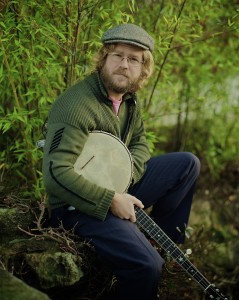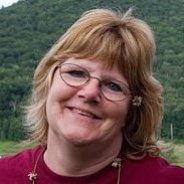Old Man Ludecke is a mighty fine banjo pickin’ musician. He’s an award-winning musician who resides way up yonder in Chester, Nova Scotia. He’s currently nominated for a Juno Award for his latest album, Tender is the Night. (The Juno is Canada’s equivalent of the Grammy Award in the United States) Americana / bluegrass legend Tim O’Brien produced this CD along with a crackerjack Nashville band, and it’s receiving all kinds of kudos south of the (Canadian) border too. Read about Old Man’s musical influences, songwriting, and his foray into recording in Nashville. And check out this delightful video of “Little Stream of Whiskey.”
You’ve described the banjo as an instrument that has natural buoyancy. Because the tone of the banjo is so distinct and, for lack of a better word at the moment, so upbeat and perky, are you able to twist and turn various melodies into happy songs even when they’re actually far from that?
Most song lyrics I write are kind of sad and hopeful at the same time. I’m much inspired by the Carter Family and early American folk music, which often sounds happy but lyrically is pretty mournful.
Has the banjo always been your instrument of choice? Or did you try your hand at another instrument before you settled on the banjo?
For writing songs, banjo has always been my instrument of choice. I played piano and clarinet when I was younger. I played clarinet and banjo in a car show in the Yukon for a time, but as a total expression I’ve found myself most clearly in old-time banjo.
Who were your early influences?
I first found my way into singing in my own very natural voice after hearing Bascom Lunsford on the Harry Smith Anthology of American Folk Music.
You’ve said that the Old Man moniker is a nickname that has been with you for a while.
Indeed, I had a co-worker who saddled me with that when I was 22 (I’m now 37). I quit a bunch of jobs and have retirement cards my wife drew with the name long before she first drew it on a poster for a gig.
Your latest album, Tender is the Night, was recorded in Nashville. Was this a first for you or were your other albums recorded there as well?
First go there.
Tell us about working with Tim O’Brien as the producer of your CD.
We all played live and did the best we could. Tim’s is quite a bit better than mine. He has an easygoing brilliance that I found comforting, awe inspiring, and a bit of an ultimate foil to my songs.
Do you feel that your writing has changed since you moved to a rural environment? If so, in what ways?
Not sure any more; all my records have largely been written in rural environments. I’m a real city kid gone country. Most people are the other way round.
What’s life like now that you’re the father of twin girls? Has the rhythm of your days at home changed since they were born?
There’s a lot more oatmeal on my guitar. We’re expecting another baby in June! There’s a bit of wild rhythm now, but it will likely be more syncopated for a while.
What’s next for you?
I’d really like to make a perfect song, one of pure gifted magic, but there’s a lot of lesser magic yet to hammer away at, making a space for it to come along into. Likely what’s next will involve more touring. I’m really excited to explore the United States, which I know mostly from daydreams.
Like many of us, Kathy Sands-Boehmer wears many hats. An editor by profession, she also operates Harbortown Music, books artists for the Me and Thee Coffeehouse in Marblehead, Massachusetts, serves as vice president of the Boston Area Coffeehouse Association (BACHA) and on the board of directors of the Northeast Regional Folk Alliance (NERFA). In her spare time, Kathy can be found at local music haunts all over New England. This and many previous Q & A interviews are archived at www.meandthee.org/blog and www.everythingsundry.wordpress.com, as well as in the Features section of AcousticMusicScene.com.


Like/Follow Us!